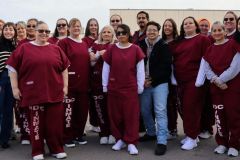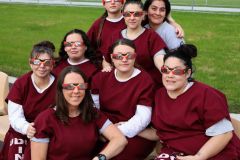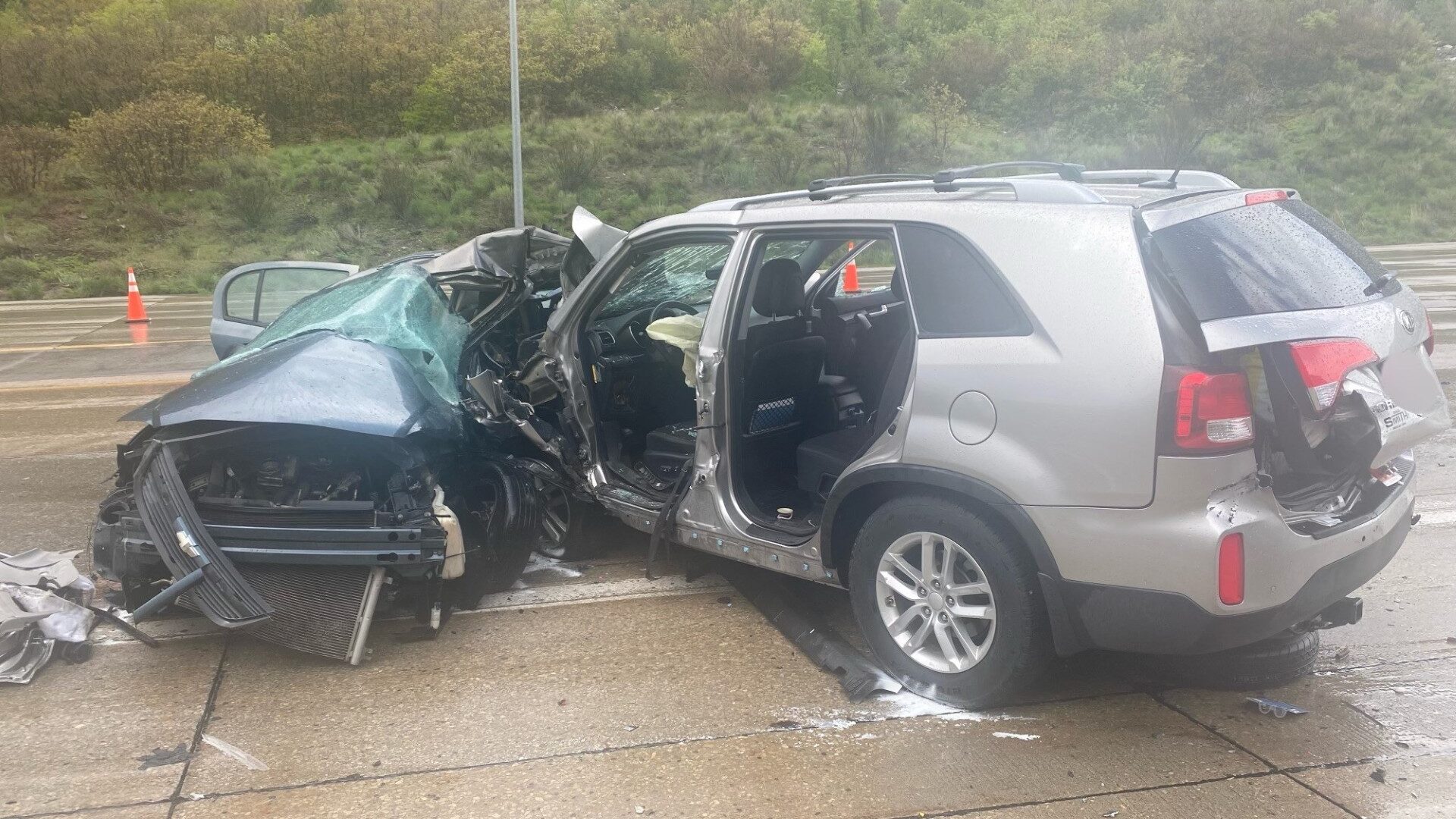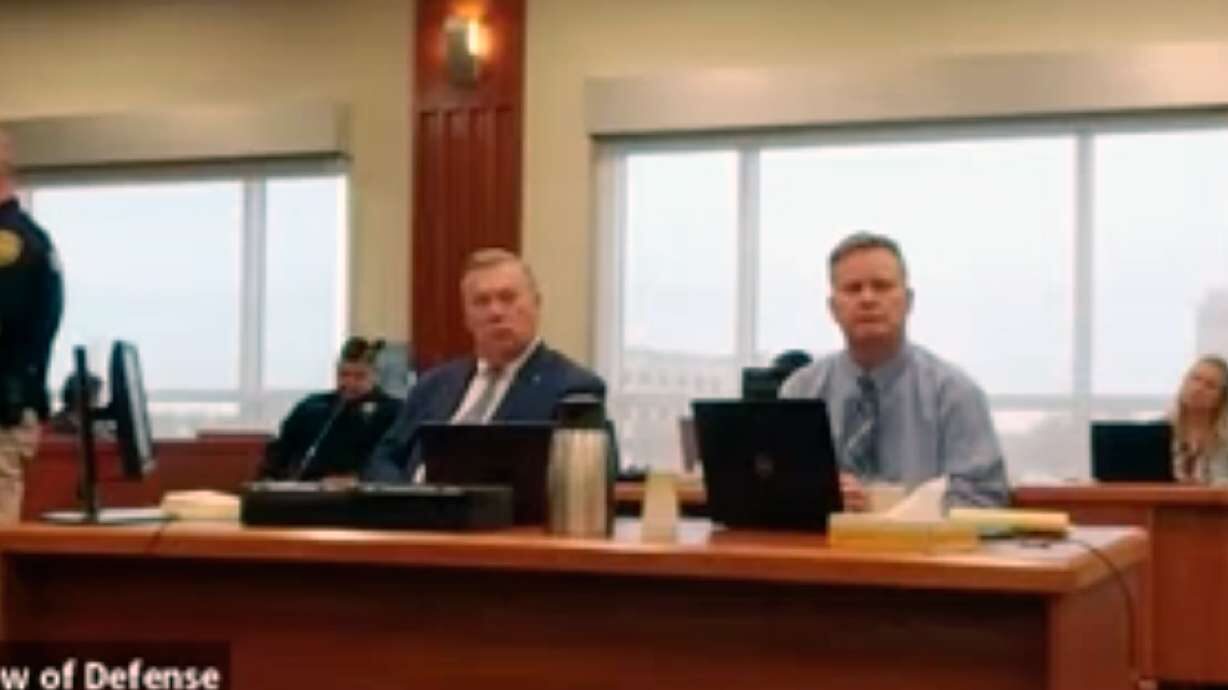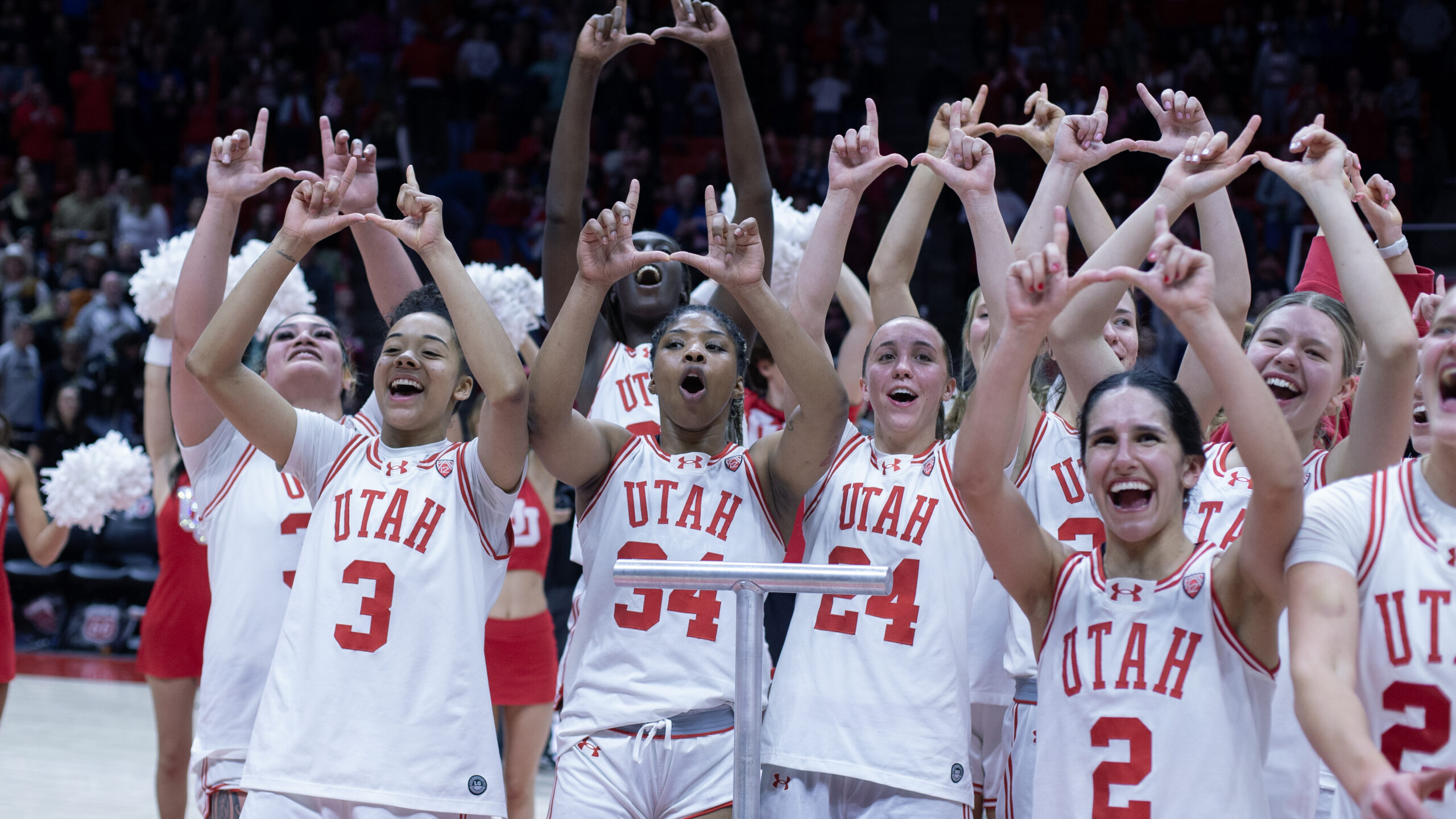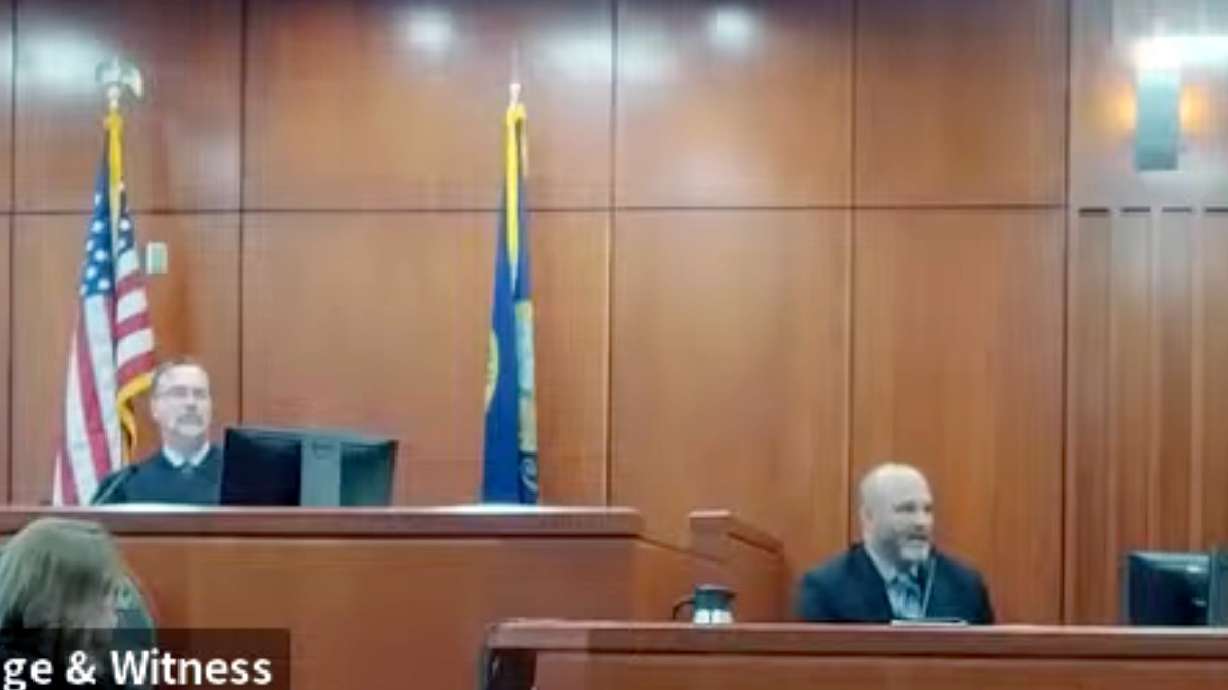Handcuffs and textbooks: A maximum security college degree
Oct 17, 2023, 6:08 PM | Updated: 7:30 pm
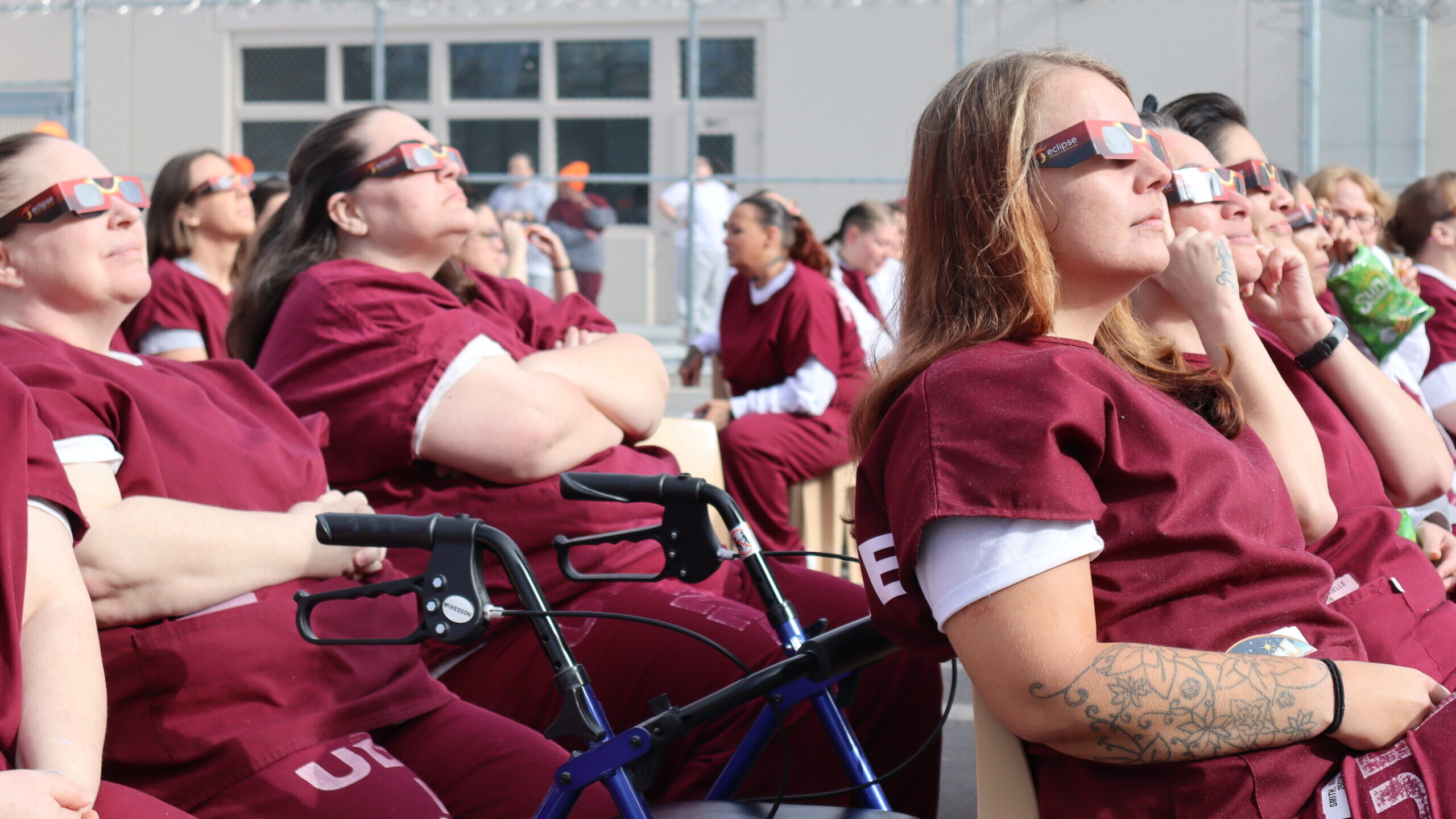
(Hugo Rikard-Bell/KSL NewsRadio)
(Hugo Rikard-Bell/KSL NewsRadio)
SALT LAKE CITY — Through the dark lenses of the cardboard UV glasses, Marina Navarro stared at the sky.
“I can’t see anything! Maybe I’ll just stare directly at it.”
She was swiftly advised not to.
Yet, she still couldn’t see anything. She couldn’t see the eclipsing sun, she couldn’t see the snowcapped mountains that frame the Wasatch Front, she couldn’t see the 10-foot razor wire fence right in front of her, or the other one just past it.
For just a moment Marina couldn’t see she was in the yard of the Emerald block, the section of the Utah State Correctional Facility that houses maximum security female inmates.
Dressing for the occasion
There were 50 women sitting on plastic chairs, gossiping in the cold morning air waiting for the moon to pass in front of the sun, revealing the ‘ring of fire.’
They all did their hair and took time to put on makeup. You could hear the typical compliments you may hear around an office. “I love your lipstick,” or “your hair looks so nice.”
Despite wearing matching maroon jumpsuits with ‘UDC INMATE’ in block letters on their backs, they all looked very different.
Marina wore purple glitter eye shadow that matched her reading glasses. She had dark lipstick and her hair was done up in a ponytail.
“I can’t believe this is the second time I’ve seen it in prison,” she said as the eclipse started to become visible between the clouds.
“This time is different than the first time … UPEP is involved, and this would never have happened without UPEP.”
Prison education and the eclipse
UPEP, or the Utah Prison Education Project, is a program that offers credited courses to incarcerated people in subjects like history, art, and the sciences. It’s funded by government assistance and private donors.
According to the Bureau of Justice Statistics, inmates who participate in prison education programs have a 43% less chance of reoffending.
Dr. Andy Eisen, the director of Prison Education at the University of Utah, runs the UPEP.
“We’ve worked closely with NASA to give an opportunity for incarcerated folks, both here and at the central Utah prison, to view the eclipse. 700 glasses have been passed out throughout the two prisons,” he said.
He was busy setting up individual plates with a breakfast bagel, Sun Chips, and a Moon Pie. He explained there were also astronomers who were coming to talk to inmates about the eclipse.
“A beautiful event like this should be shared,” he continued.
“I think about the incarcerated women … they can then share [this experience] with loved ones, and have a common experience, which is really difficult when you’re incarcerated.”
Marina’s story
Marina is doing a long stretch. Thirteen years ago she was sentenced to 15 years to life for murder.
“I don’t see the board until another twelve years … so I’ll be like 49 I believe …. somewhere around there.”
Her family is from Mexico and came to the United States illegally. She got here when she was two years old.
“I was actually brought by a stranger to America in a bus,” she said.
Much of her early life was spent in Inglewood and Compton in Los Angeles.
Marina moved to Utah when she was 12 and was offered a full-ride scholarship to any college in Utah.
“I did very well in school, like high school, and then my brother got incarcerated and so, I started to not do so well anymore.”
When she graduated from high school, she was poised to be the first person in her family to go to college and decided to go to Weber State University.
It was a lonely existence for Marina those first couple of years and she struggled both academically and socially.
“I didn’t really relate to anybody in school,” she said.
“We were never supposed to talk about the fact that we were in this country illegally. So, a lot of the time nobody knew.”
She said at the time, she knew she wouldn’t make it through college.
“I had to answer to somebody about like, my progress and grades and I would lie about what I was doing, because I didn’t want to lose my scholarship.
“I went to visit my sister for a concert and the college called me … and I go ‘what am I doing?’ Like, you’re [I’m] not going to graduate.”
From the classroom to a cell block
When the judge swung his gavel and handed down his sentence to Marina, the phrase “sobering moment” didn’t cut it.
“This was not an environment I ever thought I would be in,” she said straight-faced, looking through the novel paper glasses at the eclipse.
“For months, I couldn’t sleep until like three in the morning … just thinking over every single detail of my previous life and how, like, I could have changed something, but I didn’t. You know?”
The first 10 years were hard, Marina said.
There was a cheer from the small crowd, the moon had just, mostly,1 covered the sun.

An annular solar eclipse is pictured in Torrey, Utah, on Saturday, Oct. 14, 2023. A phenomenon known as the “ring of fire” is visible because of the way the sun’s edges perfectly surround the moon. (Laura Seitz, Deseret News)
“There were times when I didn’t want to do anything, I would be in my nightwear all day,” she continued.
“The first class I actually went to wasn’t an actual credited class. It was to help people to graduate [with] their GED.”
A math professor from the University of Utah taught the class.
“I was like; ‘I’m good at math. I’m going to do this,” Marina said.
That first lesson re-sparked a love for learning Marina had forgotten about years ago.
Almost 10 years later she’s completing classes for her associate degree in anthropology from Salt Lake Community College.
“That’s who I always wanted to be, was an anthropologist,” she said.
She’s also studying history classes with UPEP. At the moment her favorite topic is the French Revolution.
“The subjects of France wanted to be free. They were broke. They have no money. And what happens when there’s no money? There’s chaos.”
A family motivation
Marina is close with her younger sister her son, who she had in prison. Her sister is also in college, and her son is still in school.
“When I started talking to my son, he told me; ‘I don’t want to go to college’, and I was like; ‘Oh my God, you’re breaking my heart,” she said.
Her son told her college just wasn’t for him and didn’t teach people everything.
“So I told him; ‘you know what, you are 100% right about that, but it teaches you things that you would never realize you didn’t know.”
He’s still in school, but the fact they are both studying and taking classes has created a bond between them.
“I tell him: ‘I love going to school’ and so then he’ll tell me how his classes were, and he’ll be more open about (the) subjects that he hates, or the subjects that he likes, you know?”
Inmates are students once they enter UPEP’s classroom
It’s no secret that in prison there are divisions between inmates.
Things like race, gang affiliation, and socioeconomic background can mean you don’t speak with certain people on the block.
Inmates leave all that at the door of the UPEP classroom, according to Marina.
“Whether we get along outside the class doesn’t matter in class, we respect each other. You find common ground and you realize it’s not just education where you find common ground, but that education opened the door.”
Marina has a long stretch of time to serve, but if she continues to participate in UPEP she will still likely be the first in her family to graduate with a college degree, provided her younger sister doesn’t pip her at the post.
“Thinking about the fact that I know I’m going to walk [for graduation], I think it’s going to be very surreal.”


